Citrus and Herb Marinated Olives
on Dec 23, 2021, Updated Nov 15, 2023
This post may contain affiliate links. Please read our disclosure policy.
Everyone loves an appetizer that dresses up store-bought ingredients. That’s all you have to do for these citrus and herb marinated olives. Just combine a big bowl of olives, diced oranges and their zest, red chilies, sprigs of fresh rosemary and spices. Then wait for their flavors to develop and meld together before you enjoy them with your guests or on your own for snacking.
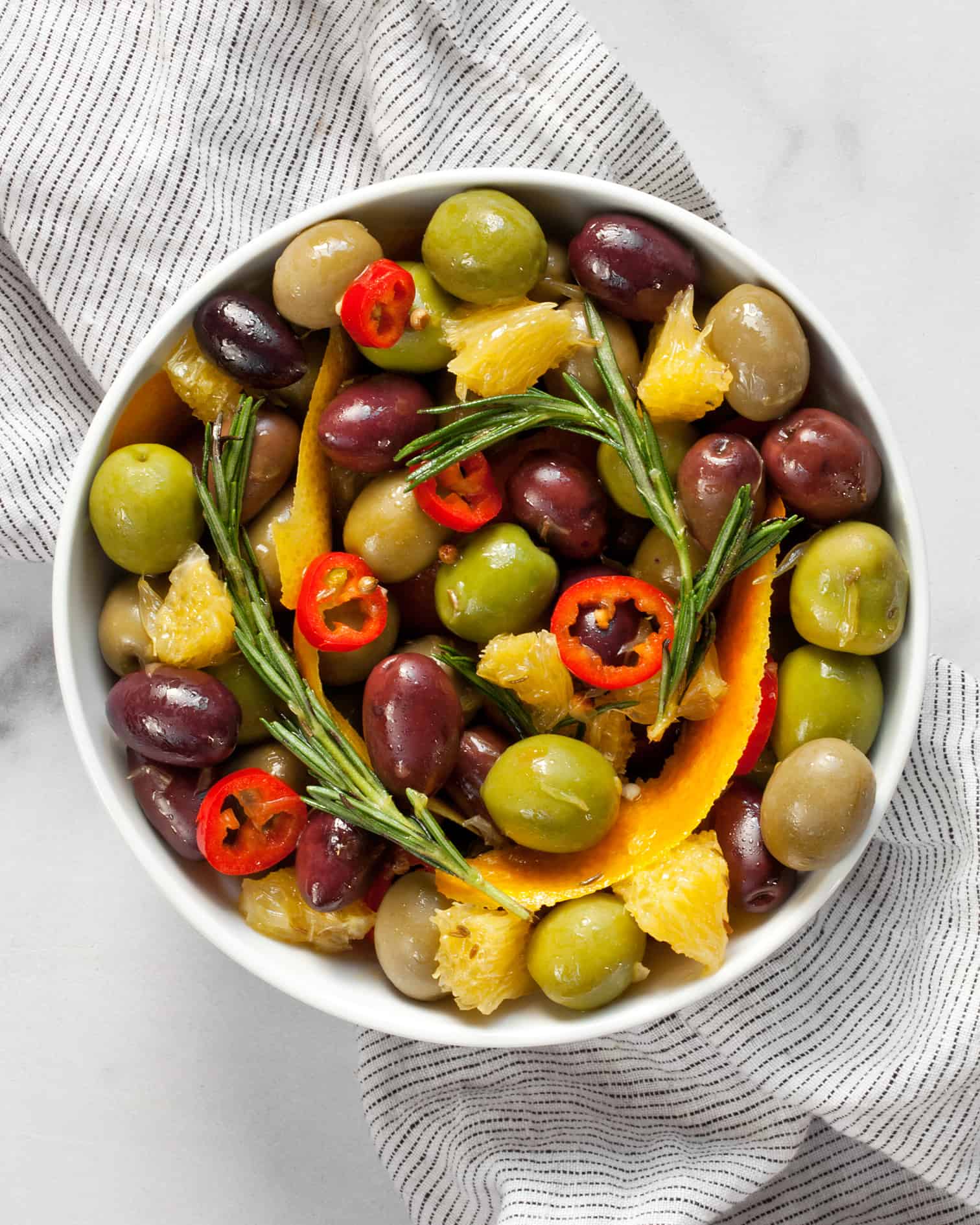
Table of Contents
Why You’ll Love This Recipe
Olives are a fantastic pantry ingredient. I find endless ways to use ingredients from the olive bar or from the antipasto in the Italian section at the grocery. With everything from roasted tomatoes to roasted red peppers to artichokes, it is a gold mine for pastas, pizzas and appetizers, too.
Even though olives are already cured and sometimes marinated in garlic and herbs, you can take it a step further. In only 5 minutes or so, you can combine them with flesh and zest of an orange, sliced chilies, spices and olive oil. It gives you lovely freshness. Allow the olives time to sit in that flavorful, fragrant mix, and you will be rewarded.
There’s something so satisfying about fancying-up store-bought food. It may involve a recipe, but it feels more like a kitchen hack, the kind of thing you want to tell all your friends about to spread the word.
Best Types of Olives for Marinating
With its vats of different varieties, heading to the olive bar is probably your best bet. It’s the easiest and most economical way to get the exact amount of olives you need for this recipe (1-1/2 cups), while scooping a little of this and that when it comes to types.
I love how the colors look in a range of greens and deep browns, but of course, it’s for taste first. Here are a few of my favorites:
- Kalamata olives: In a dark brownish purple, these Greek olives are one of the most recognizable. You find these fruity and kind of smoky olives in tapenades, and of course, the classic Greek salad.
- Castelvetrano olives: Unlike other varieties, these bright green olives are much more mild in flavor and almost buttery. They are a great balance to more assertive, salty olives.
- Liguiria olives: These Italian olives are a combination of brown and yellow-green. They are smaller in size and cured in bay leaves and herbs such as rosemary and thyme.
Should You Use Pitted Olives?
This depends on your personal preference. When I am eating an olive mix for an appetizer, I like them with the pits rather than seeing that machine drilled hole on one end. I realize not everyone enjoys having to attempt to elegantly spit out the pit, especially in front of other people. So it is up to you whether you serve olives with or without pits.
On the other hand, if I am using olives as a component in a dish like a salad or pasta where they will be combined with other ingredients, I always use pitted. When you are chewing, it is awkward to spit out pits.
The Ingredients
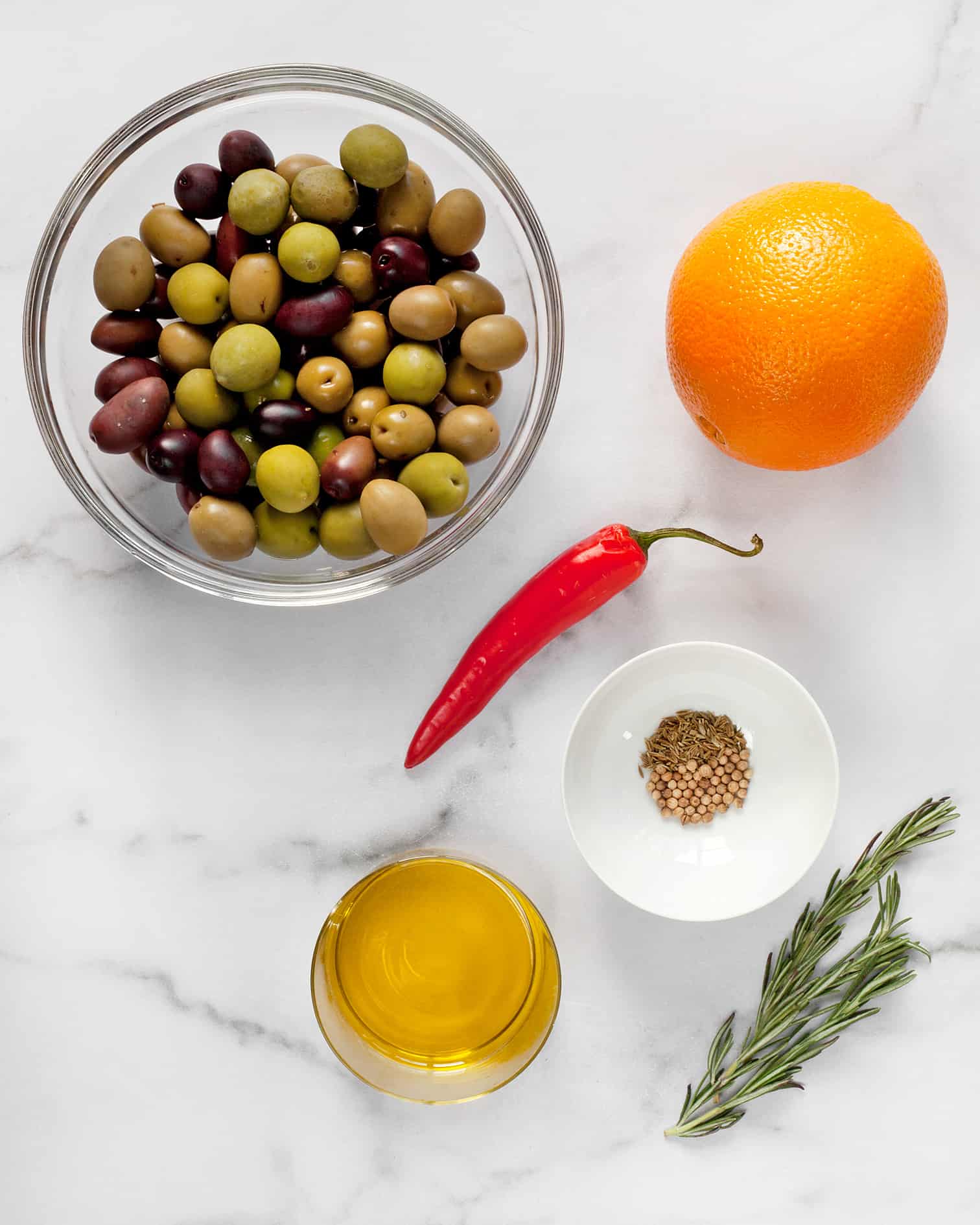
This is what you need:
- Olives: Make sure to use more than one type. It’s best to use 3-4, so you get a variety of colors and flavors to mix with the citrus. As mentioned, olive types include Kalamata, Castelvetrano, Liguiria, Picholine, Nicoise and Cerignola.
- Oranges: Keep it simple and stick with a navel orange. First peel off the zest and then slice off the white pith before removing the segments and dicing them.
- Red chili: A thinly sliced red chili adds a little heat until you take a bite of one. I love having that option if I am in the mood for something spicy. I prefer a sliced fresh chili rather than red pepper flakes.
- Coriander & cumin seeds:These earthy spices have a way of complementing each other. That’s why you see them paired in recipes.
- Rosemary: Playing up the blend of cured, fresh and dried ingredients, I add a few sprigs of rosemary to the marinade. You can substitute with other fresh herbs such as fresh thyme or use both.
- Olive oil: This is a recipe where you want to definitely use a high quality extra virgin olive oil.
How To Make Marinated Olives
- Prep the orange. Use a vegetable peeler to remove the zest. Then slice off the white pith. Remove the orange segments and dice them. Place the zest and oranges in a large bowl.
- Combine the olives, olive oil, chilies, coriander seeds, cumin seeds and rosemary with the oranges and zest. Stir everything around to combine. Let the olives marinate 1 hour at room temperature before serving.
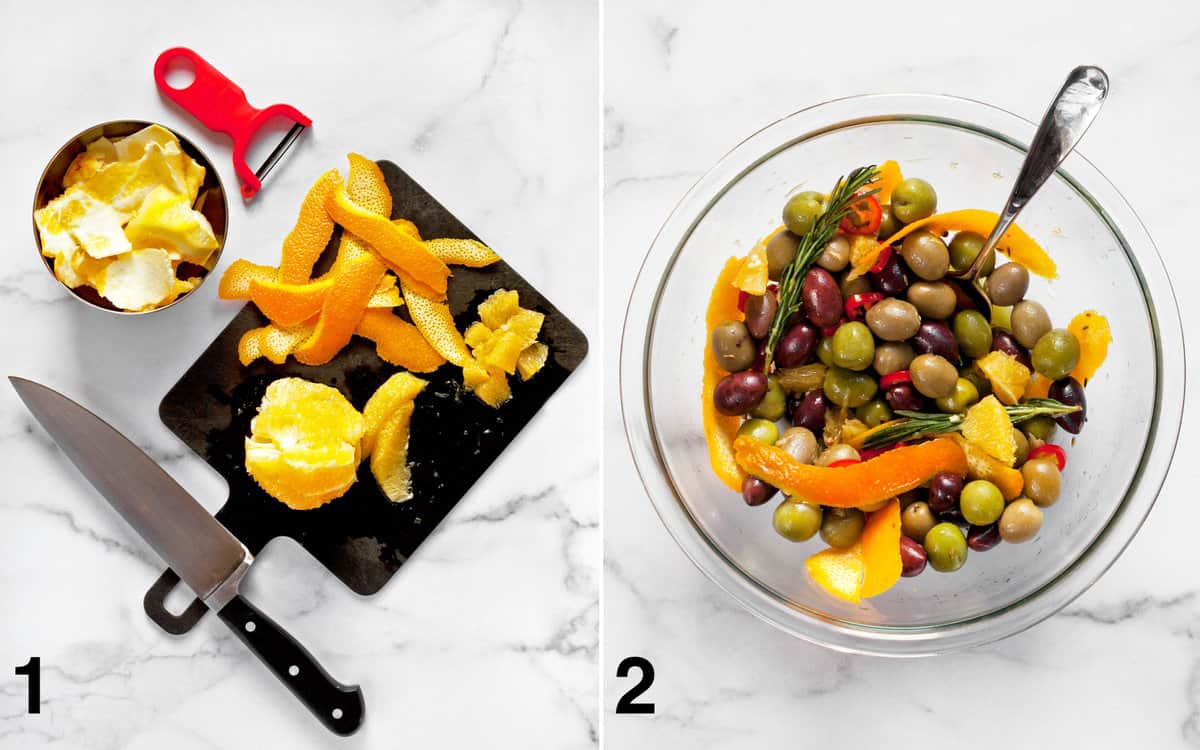
Serving
These olives are pretty special on their own, but if you really want to score points with your guests, include them as part of a charcuterie board or cheese board for any holiday including Thanksgiving, Christmas or New Years Eve.
A beautiful spread will go a long way especially if you are trying to serve heavy appetizers instead of a full meal. Everyone loves to graze. You can even bake your own homemade crackers too.
Storage
You can keep the marinated olives in a jar or another airtight container in the fridge up to 3 days. After that, the oranges may start to fall apart, and the citrus flavor will get even stronger. Allow 30 minutes to 1 hour for them to sit out at room temperature before serving, so the oil has a chance to become liquid again and the mixture isn’t as cold.
Recipe Tips
You can make the olives up to 2 days in advance. They will have even more citrus flavor. Just store them in an airtight container in the fridge. The oil will likely harden in that cooler temperature. Let the olives sit out at room temperature, and the oil will liquefy again.
Use a mix of different types of olives. Not only does it add more color, olives have different textures. Some are more meaty or firm than others. The variety is nice.
If you have leftover olives, add them to salads. You can chop them and stir them into pastas.
Recipe FAQs
If you prefer lemon, go ahead and stir in the lemon rind like you would with the orange peel. Lemon is stronger than orange, so I would skip stirring chunks of lemon into the olives. Remember that oranges are a fruit that people eat on their own. Lemon juice or lemon zest is usually an ingredient that’s an accent.
Yes, you can thinly slice a fresh garlic clove and stir it into the olives.
I don’t recommend freezing them. The will lose their texture and bite when you freeze and thaw them, and it will negatively impact their flavor.
More Olive Recipes
Baked Goat Cheese Tomato Dip
Baked Tortellini with Broccoli and Olives
Green Bean Salad with Tomatoes and Olives
Easy Citrus Salad
Roasted Cauliflower Salad
Mediterranean Bean Salad
Chickpea Greek Salad
Citrus and Herb Marinated Olives

Ingredients
- 1 navel orange
- 1-1/2 cups mixed olives, drained (3-4 types such as Kalamata, Castelvetrano, Liguiria, Picholine, Nicoise and Cerignola)
- 1/4 cup olive oil
- 1 red chili, thinly sliced
- 1/2 teaspoon coriander seeds
- 1/2 teaspoon cumin seeds
- 3 sprigs fresh rosemary
Instructions
- Use a vegetable peeler to remove the zest from the orange. Then slice off the white pith. Cut out the orange segments and dice them. Place the oranges and zest in a large bowl.
- Combine the olives, olive oil, red chilies, coriander seeds, cumin seeds and rosemary with the oranges. Gently stir the mixture to combine.
- Marinate for 1 hour at room temperature before serving.
Notes
Nutrition
Nutrition information is automatically calculated, so should only be used as an approximation.


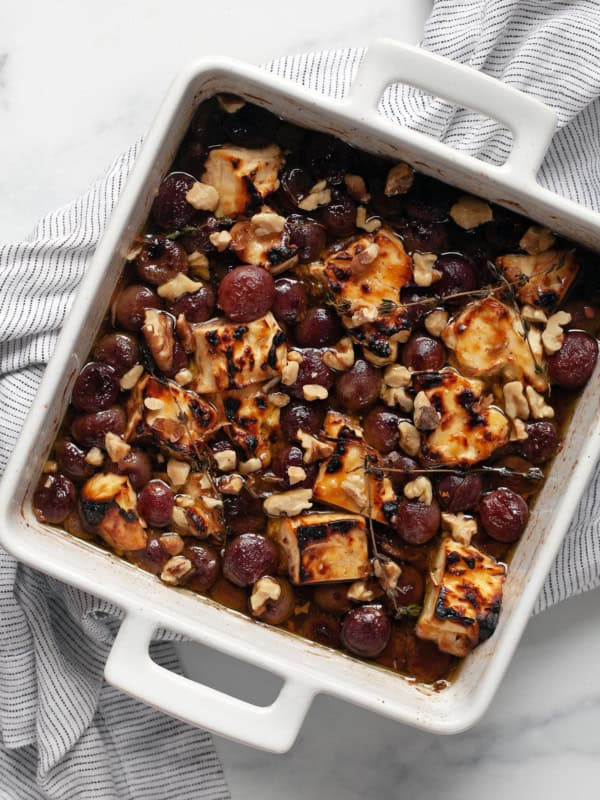

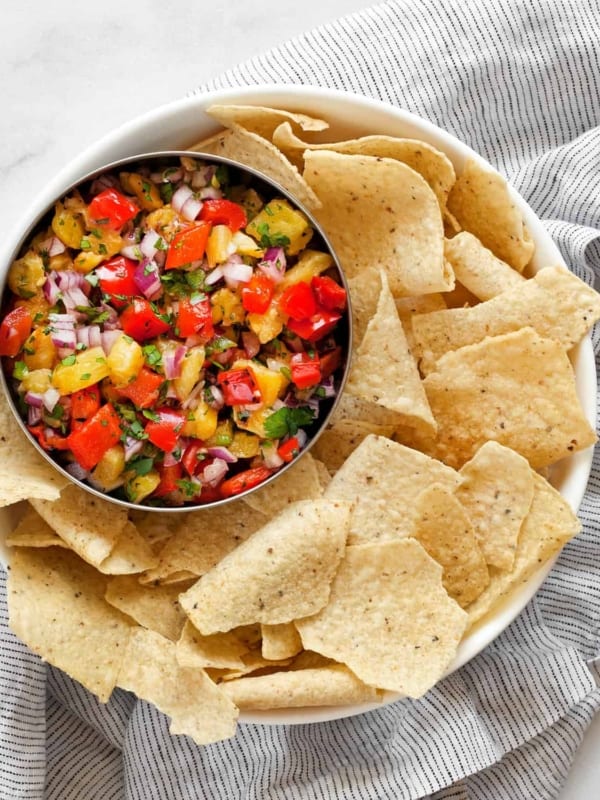









Forced to google because the pre-prepared one I’m eating had lost the flavour of it’s marinade items.
I found you.
I love your recipe. I might add maybe a few bigger pitted ones so that they can be stuffed with a favourite cream cheese or anchovies or nuts, whatever